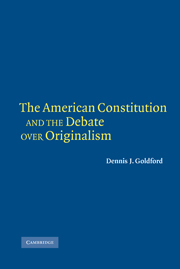Book contents
- Frontmatter
- Contents
- Preface
- Introduction
- 1 The Politics of Originalism
- 2 The Concept of a Living Constitution
- 3 Interpretivism and Originalism
- 4 The Paradox of Originalism
- 5 The Problem of Objectivity
- 6 The Epistemology of Constitutional Discourse (I)
- 7 The Epistemology of Constitutional Discourse (II)
- 8 The Ontology of Constitutional Discourse (I)
- 9 The Ontology of Constitutional Discourse (II)
- 10 Conclusion: The Political Character of Constitutional Discourse
- Index
3 - Interpretivism and Originalism
Published online by Cambridge University Press: 14 May 2010
- Frontmatter
- Contents
- Preface
- Introduction
- 1 The Politics of Originalism
- 2 The Concept of a Living Constitution
- 3 Interpretivism and Originalism
- 4 The Paradox of Originalism
- 5 The Problem of Objectivity
- 6 The Epistemology of Constitutional Discourse (I)
- 7 The Epistemology of Constitutional Discourse (II)
- 8 The Ontology of Constitutional Discourse (I)
- 9 The Ontology of Constitutional Discourse (II)
- 10 Conclusion: The Political Character of Constitutional Discourse
- Index
Summary
The essential insight of the originalist paradigm in contemporary American constitutional theory is the proposition that the purpose of a constitution is to bind the future to a fixed, fundamental norm. Particularly noteworthy is the suggestion that it is the function of a constitution to stand as a bulwark against at least some aspects of historical change. A constitution, that is, exists not to facilitate change, for change is the norm. Rather, a constitution, insofar as it binds the future to a fixed, fundamental norm, exists to manage change, that is, to impose a structure on change, to channel it in some prescribed manner in accordance with that fixed, fundamental norm.
We thus encounter here the political manifestation of the classic philosophical problem of the relationship between permanence and change: The principle of permanence is represented by the Constitution, and the principle of change is represented by majority rule. In a constitutional democracy, where society is governed for the most part but not entirely by majority rule, a constitution plays a dual role. At one level, it secures to popular majorities and their representatives a space in which they may act freely to legislate certain rules and policies binding on everyone in society regardless of one's values or preferences to the contrary. In this sense we can say that a constitution enables or empowers majority rule, and thus does accommodate change. However, more fundamentally, a constitution establishes the outer boundaries of the space within which popular majorities may act.
- Type
- Chapter
- Information
- The American Constitution and the Debate over Originalism , pp. 90 - 121Publisher: Cambridge University PressPrint publication year: 2005



